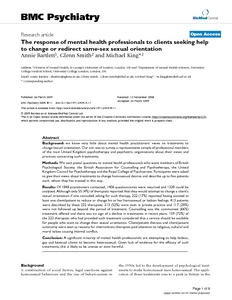Bartlett, A; Smith, G; King, M
(2009)
The response of mental health professionals to clients seeking help to change or redirect same-sex sexual orientation.
BMC PSYCHIATRY, 9 (11).
ISSN 1471-244X
https://doi.org/10.1186/1471-244X-9-11
SGUL Authors: Bartlett, Ann Elizabeth Adams
![[img]](https://openaccess.sgul.ac.uk/107311/1.hassmallThumbnailVersion/The_response_mental_health_professionals_seeking_change_sexual_orientation.pdf)  Preview |
|
["document_typename_application/pdf; charset=binary" not defined]
Published Version
Download (170kB)
| Preview
|
Abstract
BACKGROUND: we know very little about mental health practitioners' views on treatments to change sexual orientation. Our aim was to survey a representative sample of professional members of the main United Kingdom psychotherapy and psychiatric organisations about their views and practices concerning such treatments.
METHODS: We sent postal questions to mental health professionals who were members of British Psychological Society, the British Association for Counselling and Psychotherapy, the United Kingdom Council for Psychotherapy and the Royal College of Psychiatrists. Participants were asked to give their views about treatments to change homosexual desires and describe up to five patients each, whom they has treated in this way.
RESULTS: Of 1848 practitioners contacted, 1406 questionnaires were returned and 1328 could be analysed. Although only 55 (4%) of therapists reported that they would attempt to change a client's sexual orientation if one consulted asking for such therapy, 222 (17%) reported having assisted at least one client/patient to reduce or change his or her homosexual or lesbian feelings. 413 patients were described by these 222 therapists: 213 (52%) were seen in private practice and 117 (28%) were not followed up beyond the period of treatment. Counselling was the commonest (66%) treatment offered and there was no sign of a decline in treatments in recent years. 159 (72%) of the 222 therapists who had provided such treatment considered that a service should be available for people who want to change their sexual orientation. Client/patient distress and client/patient autonomy were seen as reasons for intervention; therapists paid attention to religious, cultural and moral values causing internal conflict.
CONCLUSION: A significant minority of mental health professionals are attempting to help lesbian, gay and bisexual clients to become heterosexual. Given lack of evidence for the efficacy of such treatments, this is likely to be unwise or even harmful.
Statistics
Item downloaded times since 29 Jan 2015.
Actions (login required)
 |
Edit Item |


